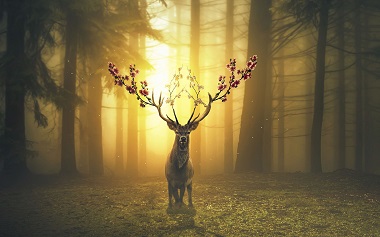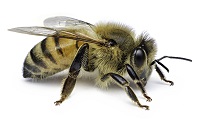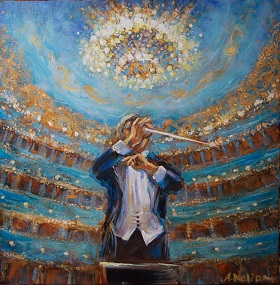Consider this... - Published May 2023

Consider This...
Series from the Energy Syndicate - May / June 2023

Life Most Valuable
A man, driving a car along a road, hits a deer. Upon inspection he is sad to see that the deer is dead. He also sees a bee, dead, squashed onto his number plate. He questions his response to the situation and wonders if the loss of the deer merits greater consideration than the loss of the bee? Is there a recognisable measure of life merit? Is all life equal?
These thoughts lead him to question the nature of life itself; is there just one life which we are all part of? Is life something that only truly exists in the immediate ‘now’, or is it perhaps something that spans through time – existing as more than just the physical one we recognise.
“Some would be more concerned about the death of the deer.”
“Why?”
“Is it the size of the life form which gives the deer greater validity? After all, the bee is only small – surely of no real consequence.”
“What of the tree under which you stand. Would the falling of the tree be a loss more than the deer because of its size?”
“The bee is short lived whereas the deer has lost years.”

“Yes. However each would only have ever lived a lifetime. The queen termite can live over 50 years. Would your sorrow be 10 times greater for the loss of the termite than the deer?”
“So if its not size or age; what makes one life, more important than another.”
“We are talking as if we know one life has to be more important than the other. I don’t know how we would know for certain.”
“What if, instead of a deer and a bee to choose between, what if we consider two people. Would anything make the loss of one person more, or less, important than the other?”
“It depends on the people I suppose. If one was a bad person and the other one was only doing good, I suppose the one that was doing good would seem like a greater loss.”
“What if we consider a child and a 90 year old. If one has an accident and dies, would it be the child that would be considered the greater loss or the 90 year old?”
“The child of course! They are innocent and have not had a chance to live.”
“If the 90 year old has a wealth of experience and a wisdom that will be of benefit to many – would that be enough to sway your choice?”
“I think it would still be the child I’d choose.”
“What if we consider a 20 year old woman heavily pregnant with triplets, instead of a 90 year old, and the child. Would your answer be the same?”
“I don’t know. When its people it seems different. I’m not sure of the answer that feels right.”
“The discussion makes me feel troubled and awkward to believe I can come to a satisfactory reply.”
“The discussion maybe ‘feels’ particularly awkward because the question posed is a question that loosely hides another question – an aspect that has not been inspected.”
“What?”

“We are looking at a question of ‘greater loss’. We have not inspected the focus of the aspect from which loss occurs. Is it an individual loss? Is there a greater condition from which there has been a loss? Has there been a loss - an actual loss? Is there a bigger picture in which the entity of life stands whole?”
“Is it a decision based on who or what you love the most? Does that make one life seem more important to you; a loss you perceive to your own experience acting as a gauge?”
“When Jesus dies on the cross, a loss is experienced by his friends. Was he actually lost?”
“It seems sad to be talking about this and making ourselves look at life as though it is a tragedy in the making.”
“I know. Painful. Especially when an assumption of the discussion is that we are choosing, in some way defining a life as less worthy.”
“Life is wonderful and should be celebrated.”
“A miracle. The true and full nature of which is barely seen by us in the narrow window of experience we are privileged to have.”

“What is life?”
“Is life, what we describe as life, a thing purely of the immediate now. Made up of all its parts but as a quality / state of existence, that is not what has just gone or what is about to happen But of the ‘now’.. an ‘immediate now’ where only that moment can be described as alive OR….. Yes OR….. Is life an entity that transcends the boundaries of time. An entity which we sense as the flow of existence.”
Do you think scientists know?”
“Asking some scientists “What is life?” may be like asking a scientist about the painting on the ceiling of the Sistine Chapel, who answers, “The ceiling of the Sistine Chapel is a painting using a soft carbonaceous schist and a red-ochre variety of haematite.” Although the answer may have a technical correctness, it says nothing about what it is in the way that makes it stand out as a masterpiece and the inspiration it evokes.”
“What is the most important part of that painting?”
“Which is where an awkward nature in answering emerges in a similar way we experienced an awkwardness in our discussion. You personally may look at the painting and see parts which appear to be more important or appealing. The whole however is the experience upon which all aspects considered to be great emerge and appear as great. If you were tasked with having to remove 1% of the faces, how would you decide which aspects were to be whitewashed over? An act, if completed, no matter how it is completed, will always feel like an awkward, unpleasant choice. It is not just what is removed that is of a concern but the fact that the picture will never look as it could; having a sense of the ‘whole’ being damaged. This however is a pained act of those who care – those who love that particular painting and the wealth it brings to them and others.”

“But life is not a painting.”
"No, its not, but like the painting, who am I, or who are you, to decide what bits are more important than others – we are not the creator.”
“In life we can’t see the whole picture. Although we might try to ‘think’ our way to decisions, deep inside we know that there is something wrong with believing we are making informed decisions - or even have that right to do so.”
“How can we live happily if we are doing things wrong such as killing animals, and even plants, to eat and live?”
“We do what we do to live but that should never be done with a disrespect or destain for life. Nor a belief that with the knowledge we have gives a justification to claim dominion over the wonder of life. The bigger picture is more than just the picture of the here and now on earth. We do not know all but in faith we can be happy.”
“So what do you think the answer is when considering the bee and the deer?”
“I think there may be more than one answer depending upon the position adopted when considering the question.”
“Yes indeed – that of course could mean that the damage to the car is a cause of greater concern to some. Would such a person be wrong?”
“Oh my. That had never occurred to me. What would make a person of the world so insensitive to life.”
“‘They’, might not be insensitive, just distracted by the life commitments they have burdened themselves with.”
“It is a shame it is not possible to ask the bee for an opinion. From it's position, given the chance of choosing, i'm sure it's choices, and response, would be very focused!”
"Quite..."
“I have been listening to you all talk about this but heard no clear answer.”
“Its never a clear answer to that sort of question regarding the value of life.”

“The experience of life is like living in a never ending masterpiece of music. When something dies / is no longer there as it was, it may appear that the absence could be an end to the beauty, but, unlike the picture which is fixed on one theme, the music can gather and change, forming and re-forming the wonder in the mind. All that has gone, and all that is to come, is all part of the same masterpiece.”
“We troubled ourselves over the bee and the deer because we see the beauty of life but were trying to decide something as though we had an authority over 'life' itself, rather than trusting in the wonder of the creative force. Our attempts to add to the masterpiece as opposed to just marvelling at it is like contributing a blast from an air-horn. We are part of life's music – not the conductor.”
“So should we never try to resolve difficult situations, try to find answers to the difficult questions that we find ourselves confronted with in life? I’d feel useless if I could not at least try.”
“Its not foolish to try to do the right things when considering life. As long as your heart and mind is not driven by foul intent, your choices, no matter how great or small, should not linger as overbearing judgements upon yourself for the rest of your days.”
“Yes... Peace.”




